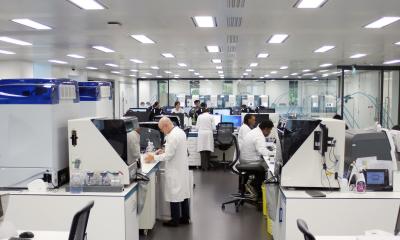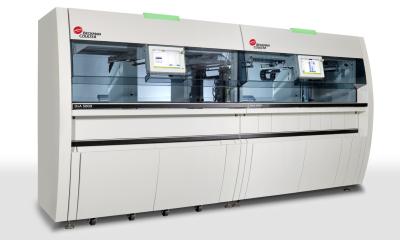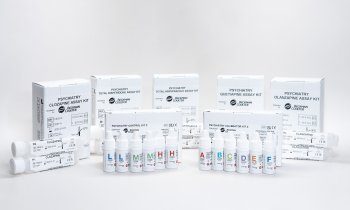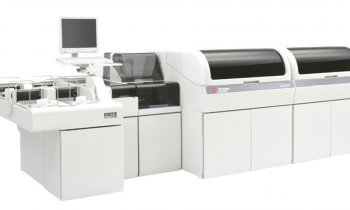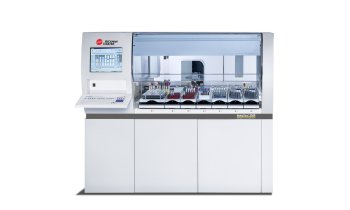Quicker lab reports saves costs
Beckman Coulter developed a new integrated lab systems: The UniCel DxC880i prototype should deliver efficient disease management services.
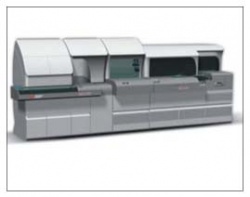
Integrated lab systems deliver efficient disease management service, says Marcel van Kasteel, Beckman Coulter Europe’s Marketing Director responsible for Diagnostics in Europe, the Middle East and Africa.
The ability to address an entire disease state in a complete patient report is an emerging trend in diagnostics. It gives the laboratory - not always a valued partner in disease management - a chance to play a more proactive role in developing services for physicians.
Clinicians require a battery of information to accurately diagnose and treat patients. At the same time they are aware of targets and cost control measures imposed by hospital administrators. However, those same administrators appreciate the concept of more efficient disease management because it suggests savings. It can also improve the quality of patient care by earlier diagnoses and therapies.
Unless laboratories start to rethink their testing requirements, these additional demands will place an impossible burden on their workloads. To meet the requirement for robust, reliable testing across a variety of disease states, they must start by pushing for a far broader test menu from their diagnostic partners. They must ensure that the menu includes testing for the growing incidence of blood viruses and infectious diseases alongside cancer, cardiac, anaemia, reproductive and other endocrine tests.
Laboratories should also seek ways of bringing together both their clinical chemistry and immunoassay systems to make full use of their individual resources. But this is not always straightforward. In most cases, it simply means linking two separate analysers together to form one consolidated workstation. But this does not automatically lead to the smooth and parallel processing of samples.
For instance, the total number of tests runs per hour for individual analysers can be misleading and do not readily apply when the systems are integrated in this way. Modern, high performance immunoassay analysers can run up to 400 tests per hour, while clinical chemistry systems perform up to 1,440 tests in the same period. For workstation consolidation to be effective, immunoassay throughput must not hold back overall turnaround time, once the systems are connected. In many cases this is exactly what happens – leading to serious throughput issues, with backlogs and the delayed reporting of even urgent results.
Beckman Coulter has taken a different and more radical approach to workstation consolidation with the provision of our new integrated UniCel laboratory systems. We started from the basis that a single point of entry for both chemistry and immunoassay tests had to significantly maximise workflow. It was essential that the integrated workstation offered parallel processing – running chemistry and immunoassay testing in tandem. Bottlenecks caused by immunoassay throughput would then be reduced and turnaround time significantly improved.
Our experts also wanted to expand on the safety and time saving benefits of closed tube sampling (CTS) technology, already on our chemistry systems, as well as aliquotting. Closed-tube cap-piercing, which is normal practice in haematology laboratories, is not commonplace in clinical chemistry and immunology departments. It removes labour-intensive de-capping and re-capping steps saving hundreds of hours a year. The sample test tubes can be put directly onto the analyser without spillage or contamination, protecting the technician while maintaining sample integrity. Manual de-capping a sample tube can spread potentially biohazard micro-particles as far as six metres. Aliquotting, using a robotic arm to automatically divide the sample into two or more additional tubes, offers similar benefits. Fewer samples need to be taken from patients and it avoids delay when clinicians call for retesting or wish for a fast turnaround of additional tests.
To succeed, a comprehensive disease management strategy requires extensive testing options and robust and reliable throughput from its laboratory. The hospital administrators will appreciate the cost savings this brings, with higher workloads handled more efficiently. But it is the patient who has most to gain, with doctors having faster access to diagnostic test results.
UniCel® CTA** links DxC 800 to DxI 800 to form the new DxC 880i**
UniCel CTA is a compact module with closed-tube aliquotting technology with a special interlocking interface on either side. It fits between the chemistry analyser (UniCel DxC 800) and the immunoassay system (UniCel DxI 800) to form one integrated unit – the new UniCel® DxC 880i Clincal System.
The DxC 880i offers a combined menu of more than 150 tests and a unique onboard capacity of 120. All reagents from both analysers can be loaded while the system is running, dramatically improving turnaround time (TAT).
A prototype of the DxC 880i will be available at Beckman Coulter’s German* offices from 13 November – 1 December 2006 and thereafter in the company’s Paris Vision Centre until June 2007. For further details contact your local Beckman Coulter office.
* Beckman Coulter GmbH – Diagnostics, Europark Fichtenhain B13, 47807 Krefeld, Germany. Phone: 49 21 513335 Fax: 49 21 51333633
** In development, pending achievement of CE compliance; not yet available for in vitro diagnostic use.
16.11.2006
- economy (1046)
- laboratory (1111)
- medical technology (1554)
- microbiology (288)
- research (3487)
- workflow (495)



